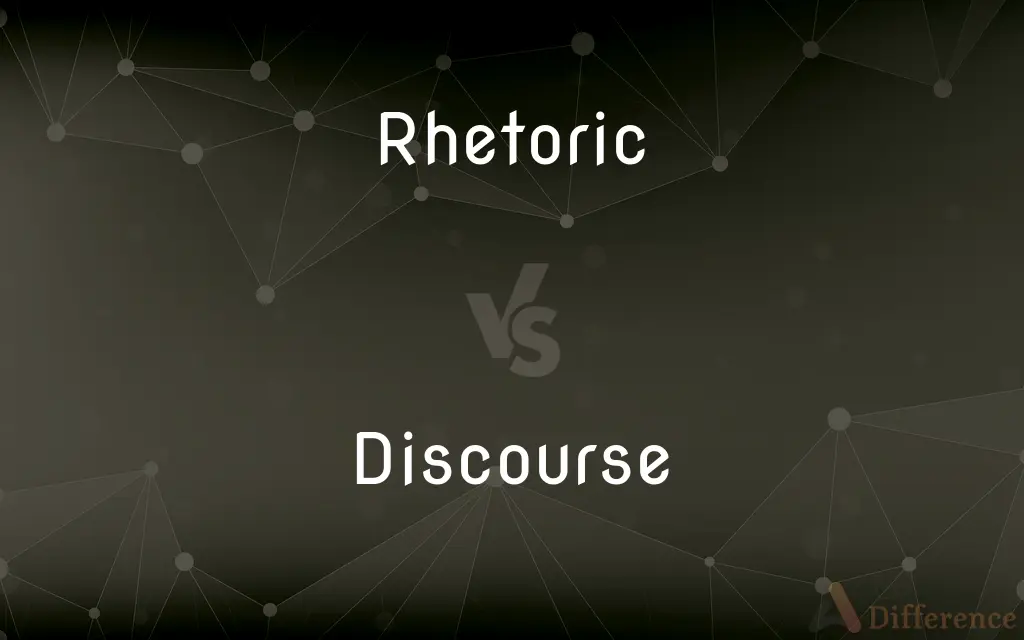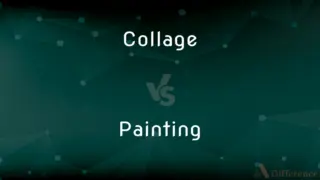Rhetoric vs. Discourse — What's the Difference?
By Fiza Rafique & Maham Liaqat — Updated on March 8, 2024
Rhetoric focuses on the art of persuasion and effective communication in speech or writing, while discourse involves structured conversation or debate on a particular topic.

Difference Between Rhetoric and Discourse
Table of Contents
ADVERTISEMENT
Key Differences
Rhetoric is primarily concerned with the strategies used to persuade or influence an audience. It encompasses the use of language, style, and argumentation to achieve a specific purpose, typically in speeches or written texts. On the other hand, discourse refers to formal and sustained communication or debate on a specific subject. It is not limited to persuasive contexts but includes any structured exchange of ideas, such as academic discussions, public debates, or written analyses.
While rhetoric often emphasizes the effectiveness and aesthetics of communication, employing techniques like ethos, pathos, and logos to connect with and persuade the audience, discourse focuses more on the content and structure of communication. It examines how ideas are constructed, shared, and debated within various contexts, such as social, political, or academic fields.
Rhetoric is usually more concerned with the speaker or writer’s ability to construct persuasive arguments, tailor messages to specific audiences, and use language creatively and effectively. In contrast, discourse analysis might explore how power relations, social identities, and cultural norms are reflected and reproduced through communication.
The study of rhetoric is often associated with classical education, tracing back to ancient Greek philosophers like Aristotle, who defined it as the ability to see the available means of persuasion in any given situation. Discourse, however, is a broader field that intersects with linguistics, sociology, and psychology, focusing on how language is used in real contexts to construct meaning and negotiate social relations.
While both rhetoric and discourse are integral to understanding human communication, they approach it from different angles. Rhetoric is more narrowly focused on persuasion and the art of effective speaking and writing, whereas discourse encompasses a wider range of communication practices, analyzing how language shapes and is shaped by social and cultural contexts.
ADVERTISEMENT
Comparison Chart
Definition
The art of persuasion and effective communication.
Structured conversation or debate on a particular topic.
Primary Focus
Persuasion techniques and aesthetics of communication.
Content and structure of communication in various contexts.
Applications
Speeches, advertising, political campaigns.
Academic discussions, public debates, written analyses.
Analytical Framework
Ethos, pathos, logos; stylistic devices.
Power relations, social identities, cultural norms.
Historical Roots
Ancient Greek philosophy, particularly Aristotle.
Broader field intersecting with linguistics, sociology, psychology.
Compare with Definitions
Rhetoric
The art of effective speaking or writing to persuade or influence.
Politicians often use rhetoric to sway public opinion during campaigns.
Discourse
Formal and sustained conversation or debate about a specific topic.
The public discourse on climate change has evolved significantly.
Rhetoric
Techniques used to enhance the persuasiveness of a message.
The advertisement’s rhetoric was designed to evoke an emotional response.
Discourse
The study of language use in texts and conversation.
Linguists study discourse to understand how people use language in real contexts.
Rhetoric
The strategic use of ethos, pathos, and logos in argumentation.
Her argument's rhetoric skillfully combined personal anecdotes with statistical evidence.
Discourse
Analysis of how language constructs social realities and relationships.
Discourse analysis reveals how language perpetuates power imbalances.
Rhetoric
A focus on the stylistic elements of communication to appeal to audiences.
The speaker’s rhetoric was filled with emotive language to connect with listeners.
Discourse
Communication practices that reflect and shape cultural and social norms.
Media discourse often reflects societal values and concerns.
Rhetoric
The study of writing or speaking as a means of communication or persuasion.
He took a course in rhetoric to improve his persuasive writing skills.
Discourse
A structured exchange of ideas within a particular context.
Academic discourse requires rigorous analysis and evidence.
Rhetoric
Rhetoric () is the art of persuasion, which along with grammar and logic (or dialectic – see Martianus Capella), is one of the three ancient arts of discourse. Rhetoric aims to study the techniques writers or speakers utilize to inform, persuade, or motivate particular audiences in specific situations.
Discourse
Discourse is a generalization of the notion of a conversation to any form of communication. Discourse is a major topic in social theory, with work spanning fields such as sociology, anthropology, continental philosophy, and discourse analysis.
Rhetoric
The art or study of using language effectively and persuasively.
Discourse
Verbal expression in speech or writing
Political discourse.
Rhetoric
A treatise or book discussing this art.
Discourse
Verbal exchange or conversation
Listened to their discourse on foreign policy.
Rhetoric
Skill in using language effectively and persuasively.
Discourse
A series of connected remarks about a subject.
Rhetoric
A style of speaking or writing, especially the language of a particular subject
Fiery political rhetoric.
Discourse
A formal, lengthy treatment of a subject, either written or spoken.
Rhetoric
Language that is elaborate, pretentious, insincere, or intellectually vacuous
His offers of compromise were mere rhetoric.
Discourse
(Archaic) The process or power of reasoning.
Rhetoric
Verbal communication; discourse.
Discourse
To speak or write formally and at length.
Rhetoric
Synonym of rhetorical.
Discourse
To engage in conversation or discussion; converse
“The two men walked around the city and discoursed on its antiquities” (Michael Wood).
Rhetoric
The art of using language, especially public speaking, as a means to persuade.
Discourse
To narrate or discuss.
Rhetoric
Meaningless language with an exaggerated style intended to impress.
It’s only so much rhetoric.
Discourse
Verbal exchange, conversation.
Rhetoric
The art of composition; especially, elegant composition in prose.
Discourse
(uncountable) Expression in words, either speech or writing.
Rhetoric
Oratory; the art of speaking with propriety, elegance, and force.
Discourse
(countable) A formal lengthy exposition of some subject, either spoken or written.
The preacher gave us a long discourse on duty.
Rhetoric
Hence, artificial eloquence; fine language or declamation without conviction or earnest feeling.
Discourse
(countable) Any rational expression, reason.
Rhetoric
Fig. : The power of persuasion or attraction; that which allures or charms.
Sweet, silent rhetoric of persuading eyes.
Discourse
An institutionalized way of thinking, a social boundary defining what can be said about a specific topic (after Michel Foucault).
Rhetoric
Using language effectively to please or persuade
Discourse
(obsolete) Dealing; transaction.
Rhetoric
High flown style; excessive use of verbal ornamentation
Discourse
(intransitive) To engage in discussion or conversation; to converse.
Rhetoric
Loud and confused and empty talk;
Mere rhetoric
Discourse
(intransitive) To write or speak formally and at length.
Rhetoric
Study of the technique and rules for using language effectively (especially in public speaking)
Discourse
To debate.
Discourse
To exercise reason; to employ the mind in judging and inferring; to reason.
Discourse
To produce or emit (musical sounds).
Discourse
The power of the mind to reason or infer by running, as it were, from one fact or reason to another, and deriving a conclusion; an exercise or act of this power; reasoning; range of reasoning faculty.
Difficult, strange, and harsh to the discourses of natural reason.
Sure he that made us with such large discourse,Looking before and after, gave us notThat capability and godlike reasonTo fust in us unused.
Discourse
Conversation; talk.
In their discourses after supper.
Filling the head with variety of thoughts, and the mouth with copious discourse.
Discourse
The art and manner of speaking and conversing.
Of excellent breeding, admirable discourse.
Discourse
Consecutive speech, either written or unwritten, on a given line of thought; speech; treatise; dissertation; sermon, etc.; as, the preacher gave us a long discourse on duty.
Discourse
Dealing; transaction.
Good Captain Bessus, tell us the discourseBetwixt Tigranes and our king, and howWe got the victory.
Discourse
To exercise reason; to employ the mind in judging and inferring; to reason.
Discourse
To express one's self in oral discourse; to expose one's views; to talk in a continuous or formal manner; to hold forth; to speak; to converse.
Bid me discourse, I will enchant thine ear.
Discourse
To relate something; to tell.
Discourse
To treat of something in writing and formally.
Discourse
To treat of; to expose or set forth in language.
The life of William Tyndale . . . is sufficiently and at large discoursed in the book.
Discourse
To utter or give forth; to speak.
It will discourse most eloquent music.
Discourse
To talk to; to confer with.
I have spoken to my brother, who is the patron, to discourse the minister about it.
Discourse
Extended verbal expression in speech or writing
Discourse
An address of a religious nature (usually delivered during a church service)
Discourse
An extended communication (often interactive) dealing with some particular topic;
The book contains an excellent discussion of modal logic
His treatment of the race question is badly biased
Discourse
To consider or examine in speech or writing;
The article covered all the different aspects of this question
The class discussed Dante's `Inferno'
Discourse
Carry on a conversation
Discourse
Talk or hold forth formally about a topic;
The speaker dissertated about the social politics in 18th century England
Common Curiosities
What is rhetoric?
Rhetoric is the art of using language effectively and persuasively in speaking or writing.
What is discourse?
Discourse is structured communication or debate on a particular topic, focusing on the exchange of ideas.
What are some common techniques used in rhetoric?
Techniques include the use of ethos (credibility), pathos (emotional appeal), and logos (logical argument).
Can rhetoric be part of discourse?
Yes, rhetoric can be part of discourse, especially in contexts where persuasion is involved.
How does rhetoric differ from discourse?
Rhetoric focuses on persuasion and the aesthetics of communication, while discourse involves the structured exchange of ideas and analysis of language in context.
How is discourse used in society?
Discourse shapes and is shaped by social and cultural norms, influencing public opinion, academic research, and policy debates.
What is discourse analysis?
Discourse analysis is the study of how language is used in texts and conversations to construct meaning and social relations.
Can anyone learn the art of rhetoric?
Yes, with study and practice, anyone can improve their rhetorical skills.
Why is rhetoric important?
Rhetoric is important because it helps individuals communicate ideas effectively, persuade others, and engage in meaningful debate.
What role does culture play in discourse?
Culture shapes the norms and values that inform discourse, influencing how ideas are expressed and interpreted.
What skills does studying rhetoric develop?
Studying rhetoric develops skills in critical thinking, persuasive writing, and effective communication.
How can discourse analysis benefit researchers?
It allows researchers to understand the underlying social, cultural, and political meanings in language use.
How do power relations feature in discourse?
Discourse analysis often explores how language reinforces or challenges power dynamics within society.
How has digital media changed the landscape of discourse?
Digital media has expanded the platforms for discourse, allowing for more diverse voices and instantaneous communication across the globe.
Are rhetoric and discourse only relevant to language and literature?
While closely associated with language and literature, they also play significant roles in fields like politics, media, and sociology.
Share Your Discovery

Previous Comparison
Collage vs. Painting
Next Comparison
Cockle vs. WinkleAuthor Spotlight
Written by
Fiza RafiqueFiza Rafique is a skilled content writer at AskDifference.com, where she meticulously refines and enhances written pieces. Drawing from her vast editorial expertise, Fiza ensures clarity, accuracy, and precision in every article. Passionate about language, she continually seeks to elevate the quality of content for readers worldwide.
Co-written by
Maham Liaqat















































